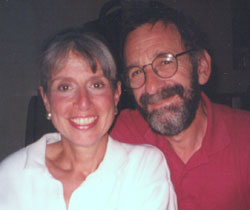1998 Distinguished Lecture Series: Ken Larner
How Good Are We? How Good Can We Be? How Good Do We Want to Be?
Biography
 Ken Larner received the degree of geophysical engineer from the Colorado School of Mines in 1960 and a Ph.D. in geophysics from MIT in 1970, after serving in Vietnam in the U.S. Army. He joined Western Geophysical Company as a senior research geophysicist in 1970 and, in August 1988, left his position as Western’s vice president for geophysical research to become the Charles Henry Green Professor of Exploration Geophysics at the Colorado School of Mines. He received the 1975 SEG Best Presentation Award, 1976 CSEG Best Papers Award, Best Paper in Geophysics in 1976 and best paper awards at the 1978 Offshore Technology Conference (OTC), the 1981 Australian Petroleum Exploration Association (APEA) Conference in Adelaide, and the SEG/UCEG Beijing ’89 International Symposium on Exploration Geophysics.
Ken Larner received the degree of geophysical engineer from the Colorado School of Mines in 1960 and a Ph.D. in geophysics from MIT in 1970, after serving in Vietnam in the U.S. Army. He joined Western Geophysical Company as a senior research geophysicist in 1970 and, in August 1988, left his position as Western’s vice president for geophysical research to become the Charles Henry Green Professor of Exploration Geophysics at the Colorado School of Mines. He received the 1975 SEG Best Presentation Award, 1976 CSEG Best Papers Award, Best Paper in Geophysics in 1976 and best paper awards at the 1978 Offshore Technology Conference (OTC), the 1981 Australian Petroleum Exploration Association (APEA) Conference in Adelaide, and the SEG/UCEG Beijing ’89 International Symposium on Exploration Geophysics.
Ken Larner is a member of the Society of Exploration Geophysicists (SEG), European Association of Geoscientists and Engineers (EAEG), and Canadian Association of Exploration Geophysicists (CSEG). He is also a member of geophysical societies of Houston (past first vice president and Honorary Member) and Denver. He received the 1988 Conrad Schlumberger Award of the European Association of Exploration Geophysicists and, in 1990, the Medal of the Society of Venezuelan Geophysicists.
At the 1996 SEG Annual Meeting in Denver, he received the SEG’s Maurice Ewing Medal, its highest award. That same year, he was inducted as a Foreign Fellow of the Russian Academy of Sciences. He was the Spring 1988 SEG Distinguished Lecturer, and a 2000-2001 Distinguished Lecturer for the Society of Petroleum Engineers.
Dr. Larner served as first vice president of the SEG (1979-80) and SEG president in 1988-89. As the Director of the Center for Wave Phenomena (CWP) at CSM (which is a research consortium sponsored by 29 companies in the oil exploration industry), his research interests include all aspects of seismic data processing, which these days relate to many aspects of acquisition and interpretation.
Abstract
No institution – certainly, no academic institution, including CSM – is as good as it possibly can be. Therefore, periodic deep self-examination through questions such as those in the title of this talk should be beneficial, even essential, to the ongoing vitality of our university.
In our dynamic world, which imposes changing demands on engineering and science graduates, and which, through changes in the character and quality of secondary-school preparation of entering students, CSM must address difficult decisions regarding how to maintain, indeed how to define, the quality of its program. This necessity is all the more so because any and all universities with which we wish to compete for students certainly are acting on the outcome of similar self-examination.
In this talk, I raise specific questions and offer opinions aimed at stirring thoughts and discussion across campus on core issues. These issues include:
- The balance and character of our undergraduate versus graduate programs
- Traditional core programs versus newer, more general engineering ones
- Relative emphasis on classroom teaching versus research
- The desired size of our student body
- The standards we choose to set for each aspect of the university
- The elements of other universities that we choose to emulate
- The steps that need to be taken to best position ourselves, once we have examined such issues.
There’s much that we can do for ourselves, not all of which is bounded by budgetary constraints, through serious inquiry of who and what we are and we want to be.